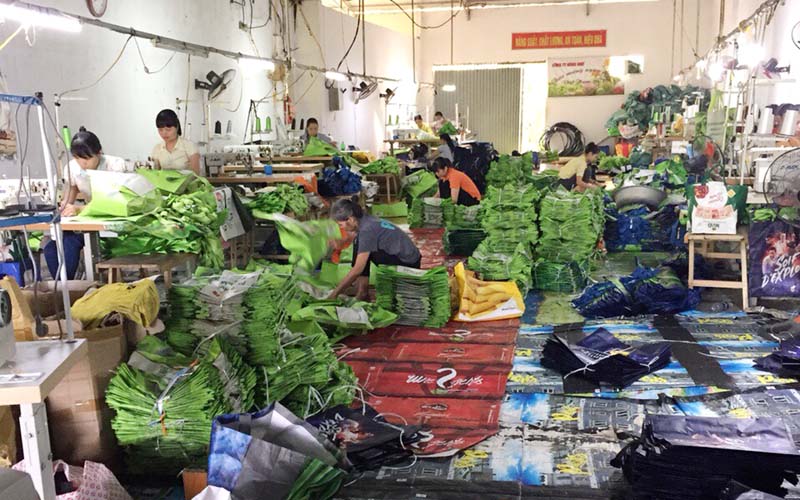
(HBO) - Currently, there are 38 enterprises, 23 cooperatives and more than 1,131 individual households in Kim Boi district have engaged in the industrial and handicraft production and trading, of which there are 75 households producing and processing and 1,065 households doing businesses of all kinds.
 Hung Nhu One-Member Limited Company in Rach
Hamlet, Dong Bac commune (Kim Boi) has been sewing bags for supermarkets,
contributing to creating jobs with the stable income for many local workers.
Hung Nhu One-Member Limited Company in Rach
Hamlet, Dong Bac commune (Kim Boi) has been sewing bags for supermarkets,
contributing to creating jobs with the stable income for many local workers.
In the past years, the district has leaded
and directed the appropriate authorities and grassroots levels to focus on
propagating and encouraging the enterprises, the production establishments and
people to actively exploit the natural resources available in the locality for
developing the production, processing and consuming the products.
The production facilities have closely
followed the market demand in and outside the district, focusing on improving
the quality of the product to maintain and find new sources to meet the
customers' requirements. The Department of Economy and Infrastructure of the
district has been trying to advise and propose the appropriate authorities to
put the planning of Kim Boi industrial cluster into use to increase the
strength of the district market soon.
In 2018, the value of the industrial and
handicraft production of the district reached 375 billion VND (at fixed prices
in 2010), reaching 117.2% compared with the plan. In 2019, the district has set
the targets and plans for industrial and handicraft production to reach 347
billion VND according to the fixed prices and 441 billion VND according to the
current unit prices. In the first quarter, the result was over 85.45 billion
VND at the fixed prices, reaching nearly 109.5 billion VND at the current
prices.
Some main products are about 28,000 m3 of
the exploited stones; 5.5 million bricks of building bricks; iron lotus,
11,000m2 of the painted sheet metal; 9,500 tons of preliminarily-processed
agricultural products; 137.5 thousand products of Chit brooms; 160,000 kinds of
pants and clothes; 3,750,000 m3 of soft drinks and so on.
Especially, Dong Bac commune has developed
4 knitting rattan and bamboo production facilities, sewing bags for
supermarkets, creating jobs for many local laborers in the district.
According to data from the Hoa Binh Provincial Party Committee, the industrial production index for the first six months of 2025 is estimated to have increased by 20% compared to the same period last year. This marks the highest year-on-year growth rate for this period since 2020.
In the first six months of 2025, Hoa Binh province’s export turnover was estimated at 1.145 billion USD, marking an 18.11% increase compared to the same period in 2024. Import turnover was estimated at $ 804 million, a 17.15% increase, which helped the province maintain a positive trade balance.
The lives of the ethnic minority farmers in Tan Lac district have gradually improved thanks to the new directions in agricultural production. This is a testament to the collective strength fostered through the professional associations and groups implemented by various levels of the district’s Farmers’ Union.
With the motto the "product quality comes first,” after nearly one year of establishment and operation, Muong village’s Clean Food Agricultural and Commercial Cooperative, located in Cau Hamlet, Hung Son Commune (Kim Boi district), has launched reputable, high-quality agricultural products to the market that are well-received by consumers. The products such as Muong village’s pork sausage, salt-cured chicken, and salt-cured pork hocks have gradually carved out a place in the market and they are on the path to obtaining the OCOP certification.
In the past, the phrase "bumper harvest, rock-bottom prices" was a familiar refrain for Vietnamese farmers engaged in fragmented, small-scale agriculture. But today, a new spirit is emerging across rural areas of Hoa Binh province - one of collaboration, organisation, and collective economic models that provide a stable foundation for production.
Maintaining growing area codes and packing facility codes in accordance with regulations is a mandatory requirement for agricultural products to be eligible for export. Recently, the Department of Agriculture and Environment of Hoa Binh province has intensified technical supervision of designated farming areas and packing facilities to safeguard the "green passport" that enables its products to access international markets.



 Hung Nhu One-Member Limited Company in Rach
Hamlet, Dong Bac commune (Kim Boi) has been sewing bags for supermarkets,
contributing to creating jobs with the stable income for many local workers.
Hung Nhu One-Member Limited Company in Rach
Hamlet, Dong Bac commune (Kim Boi) has been sewing bags for supermarkets,
contributing to creating jobs with the stable income for many local workers.